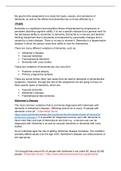My goal for this assignment is to study the types, causes, and symptoms of
dementia, as well as the effects that dementia has on those affected by it.
P1&P2
Dementia is a significant neurocognitive illness characterised by progressive or
persistent declining cognitive ability. It is not a specific disease but a general word for
the decreased ability to remember is dementia. Dementia is a memory and abstract
thinking impairment that is frequently accompanied by personality changes and is
caused by a brain disease. There is no way to reverse it. Dementia is a degenerative
disease in which the person loses their ability to care for themselves.
There are many different variations of dementia, such as:
Alzheimer’s disease
Vascular dementia
Frontotemporal dementia
Dementia with Lewy bodies
These two variations of dementia are very rare form:
Posterior cortical atrophy
Primary progressive aphasia
There are serval further other rare cases that can lead to dementia or dementia-like
symptoms. However, through the rest of the assignment we are going to focus on
three specfic types of dementia, which are:
Vascular dementia
Alzheimer’s disease
Frontotemporal lobe dementia
Alzheimer’s Disease
The most common variations that is commonly diagnosed with individuals with
dementia is Alzheimer’s disease. “Affecting around six in every 10 people with
dementia in the UK ” (Information found:
https://www.alzheimersresearchuk.org/dementia-information/types-of-dementia/
alzheimers-disease/). It is possible for diagnosed servicer user with dementia to
have more than one type of dementia at one time e.g., a service user can be
diagnosed with Alzheimer’s as well as vascular dementia or dementia with Lewy
bodies.
As an individual ages the risk of getting Alzheimer disease increases. The condition
primarily affects adults over the age of 65. Alzheimer's disease can strike persons of
any age group.
“It is thought that around 5% of people with Alzheimer’s are under 65, about 42,000
people.” (Information found: https://www.alzheimersresearchuk.org/dementia-
,information/types-of-dementia/alzheimers-disease/). These extremely rare cases of
the disease are called early-onset Alzheimer’s.
Normally as humans age their brain naturally shrinks and there thought process gets
slower. However the changes Alzheimer disease has on an induvial brain is
completely different and far more detrimental compared to what the normal ageing
process does to the brain. These alterations include the accumulation of two proteins
known as amyloid and tau, which are both essential in the progression of Alzheimer's
disease. The protein build-up harms more and more brain cells as the disease
advances. Alzheimer’s disease occurs when a build up of protein plaques and
tangles in the brain , due to this nerve cells won’t be able to passes on signals to the
brain properly thus making it ineffective. Alzheimer disease results in nerve tissues
dying due to the detrimental interruption that this condition causes in the brain
activity. This condition is found to be the slowest form of dementia to develop in an
individual. Although many different factors can change the speed progression.
People with additional health complications e.g., diabetes, heart disorders also will
experience most rapid deterioration. .An individual’s genetic make-up is also can be
a factor. This damage alters the way our brains function, resulting in Alzheimer's
symptoms.
Alzheimer's disease is a degenerative condition; thus, the symptoms may be minor
at first and develop over time. The symptoms typically develop to disrupt a service
users’ regular life. The first and most obvious symptom that is an indicator of the
disease is memory lost and difficulties trying to remember things this is down to the
damage that is occurring in the brain. Other than this there are far more early
symptoms that occur with a service user with this disease.
Here are some frequent symptoms and sign that usually occur in the early to middle
stages of having Alzheimer’s:
Forgetting a friend's name or having difficulty finding the perfect word to say in
a conversation
Forget about recent events or conversations.
Become disoriented in a familiar setting or on a familiar route
Communication issues or difficulty finding the correct words.
Some people become angry, worried, or depressed. Others may lose
confidence or become uninterested in what is going on around them.
These are just a few of a list of early on symptoms with a individuals with Alzheimer
diseases will have.
As the condition progresses, the symptoms will intensify.
The later stage symptoms of Alzheimer’s disease:
Day-to-day actions, such as operating a TV remote control, phone, or kitchen
appliance, become more difficult. Individuals might even have trouble locating
items that are right across from them.
, A few individuals may become unhappy, depressed, or dissatisfied as a result
of their difficulties. People may seek extra reassurance or become scared or
distrustful as a result of their anxieties.
Humans could have hallucinations; in that they see or hear things that aren't
actually there. Some may have 'delusions,' which are false beliefs about
events that have not occurred.
Individuals soon require greater assistance with daily tasks such as dressing,
eating, and going to the bathroom.
Mrs Anjeela Johal, case study 2, is an example of Alzheimer's disease, with
symptoms such as mood swings and difficult-to-control behaviour. She also exhibits
signs of bewilderment and neglects where she is.
Vascular dementia
Vascular dementia occurs when there is insufficient flow of blood to the brain,
causing the brain cells to die. Several factors can contribute to this, including
narrowing and blocking of small blood vessels inside the brain, a single stroke in
which blood supply to a part of the brain is suddenly cut off, and a series of mini
strokes (transient ischaemic attacks) that spread damage to the brain in a tiny but
widespread way. Often, such conditions are associated with lifestyle factors, such as
smoking and being overweight, as well as underlying conditions. Although it is not
yet known how much your risk of dementia can be reduced by addressing these,
targeting them might reduce your risk of developing vascular dementia in later life.
Post-Stroke dementia
This is when dementia occurs after a individual experiences a stroke. When blood
flow to a portion of the brain is cut off suddenly, a stroke develops. This occurs when
a blood clot blocks a major artery in the brain. When an artery rupture and bleeds
into the brain, this can happen. If this happens the name that is given is
haemorrhagic (bleeding) stroke this is because of the weakness that is in the artery
wall that is known as a aneurysm.
Small vessel disease (SVD) of the brain
Damage to the tiny arteries that feed blood to the brain can potentially cause
vascular dementia. Small vessel disease is the name for this condition (SVD).
Because these little arteries only nourish a small portion of the brain, the injury is not
visible to the individual when it occurs. Nevertheless, the harm might worsen over
time, leading to dementia. Because these small arteries can be found in any portion
of the brain, the region of the brain damaged by SVD varies from person to person.
Symptoms of post-stroke dementia might appear immediately or shortly after a
stroke, and people's general functioning can sometimes be described as "stepwise."
Some information found here:
https://www.alzheimersresearchuk.org/dementia-information/types-of-
dementia/vascular-dementia/symptoms/





